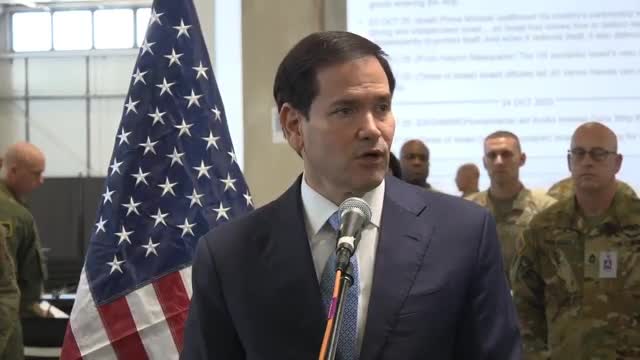U.S. secretary in Israel frames three-part push to keep Gaza ceasefire, speed aid and stand up international stabilization force
Get AI-powered insights, summaries, and transcripts
Subscribe
Summary
The U.S. Secretary of State, speaking at a press briefing in Israel, said the United States and partner countries are working to implement a 21-point plan to preserve the current ceasefire, get life-sustaining humanitarian aid into Gaza and create an international stabilization force to help demilitarize and eventually stabilize the territory.
The U.S. Secretary of State, speaking at a press briefing in Israel, said the United States and partner countries are working to implement a 21-point plan to preserve the current ceasefire, get life-sustaining humanitarian aid into Gaza and create an international stabilization force to help demilitarize and eventually stabilize the territory.
The secretary said the work is proceeding roughly 10–14 days after the agreement was signed and that progress so far is "historic and extraordinary" while cautioning the process "is not gonna be a linear journey" and "there are gonna be bumps along the road." He described the effort as three linked priorities: deconfliction and maintaining the ceasefire at and beyond the so-called "yellow line," expanding and securing humanitarian assistance, and forming a multinational stabilization force to provide security as reconstruction and governance plans are developed.
Why this matters: the secretary said the international effort aims to prevent renewed large-scale fighting, ensure hostages and remains are returned and create conditions that prevent Gaza from being used again as an operational base for terrorist groups. "We fully expect that Hamas will fully demilitarize. That is the agreement they signed on to," he said.
On maintaining the ceasefire and aid flows, the secretary said the priority is preventing flash points and ensuring humanitarian aid moving beyond the yellow line is not looted or diverted. He explained that aid efforts fall into two broad categories: deliveries just beyond the frontline (which require deconfliction) and assistance to areas behind the line that are already secure.
On the international stabilization force (ISF), the secretary said countries have offered personnel and resources but the force "hasn't been formed yet" and will require a clear mandate, command structure, rules of engagement, funding, and a formula acceptable to Israel and participating states. He said one possible route is a U.N. mandate but did not commit to a specific mechanism: "Maybe it'll be a U.N. resolution. That's one route. We could have an international agreement as well. We're working through that." He declined to identify which countries have offered or been vetoed for participation.
On enforcement if Hamas refuses to demilitarize, the secretary said refusal would be a violation of the agreement and "that'll have to be enforced," but he declined to describe enforcement mechanisms. He repeatedly framed demilitarization as a condition of the agreement and a prerequisite for longer-term reconstruction and governance.
The secretary also addressed the role of aid organizations. He said the U.N. and multiple humanitarian groups are present and working on the response, naming the World Food Programme and Samaritan's Purse among groups on the ground, and added "UNRWA's not gonna play any role in it. UNRWA became a subsidiary of Hamas." He said roughly 8–12 groups were directly involved in the operational effort in the center where the briefing occurred.
Reporters pressed about prisoners and the hostages. Asked whether the United States was seeking the release of Palestinian prisoner Marwan Barghouti, the secretary responded, "I don't have any news for you on that today. Obviously, we'll work that through our embassy here and our diplomatic channels, but we don't have anything to announce on that." He reiterated that the U.S. is continuing to press for the return of hostages and remains.
On governance and long-term reconstruction, the secretary said work on governance of Gaza "isn't at that stage yet" and that any future governance "cannot be a place that is governed by anyone who wants to use it as a launch pad for attacks against Israel." He emphasized that the 21-point plan and the commitments signed by more than two dozen countries envisage a demilitarized Gaza and that preserving the ceasefire and delivering aid remain immediate priorities.
On related diplomacy, the secretary said the Abraham Accords work could expand in the future and that a dedicated State Department unit handles normalization efforts; he said some personnel from that unit are currently deployed to support this mission.
The secretary repeatedly framed the process as multilateral and contingent on others meeting commitments: "This is not just The United States," he said. "Over two dozen countries signed on to this ... we fully expect that everyone will live up to those commitments." He said the aim is to create conditions where Gazans can find jobs and security and therefore have no interest in supporting or joining terrorist groups.
The briefing closed with the secretary saying progress has been made in the first days since the agreement but that "we've got a long ways to go" and that the effort will require more countries, resources and ideas to carry the plan through its stages.
